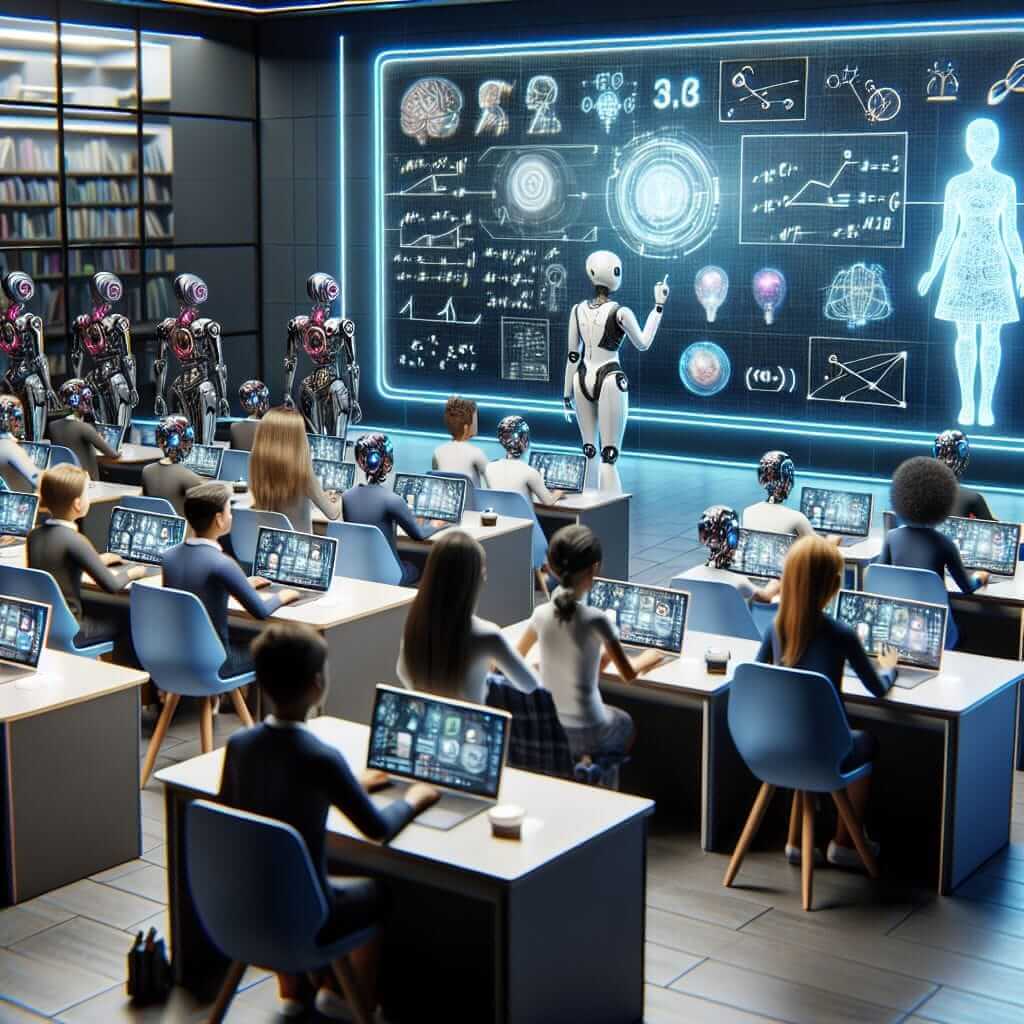The IELTS Reading section is a crucial component of the IELTS exam. It assesses your ability to understand and analyze written English through various passages and question formats. The topic “What are the social implications of increasing reliance on AI in education?” has been gaining attention in recent years, making it a relevant subject for the Reading section. By examining this topic, we can better prepare for potential future IELTS questions.
Reading Passage: The Social Implications of Increasing Reliance on AI in Education
Easy Text Level
As artificial intelligence (AI) continues to advance, its integration into education systems globally is fast becoming a reality. AI’s potential to revolutionize education lies in its ability to personalize learning experiences, automated administrative tasks, and provide real-time feedback. However, with these opportunities come significant societal implications.

Societal Benefits
Personalization of Learning
AI can tailor educational content to each student’s needs. This individualized approach can help students learn at their own pace, ensuring they grasp fundamental concepts before moving forward.
Administrative Efficiency
AI helps in streamlining administrative tasks, such as grading and scheduling, reducing the workload for educators and allowing them more time to focus on teaching.
Societal Concerns
Employment Impacts
One significant concern is the potential job displacement for teachers and administrative personnel. As AI takes over repetitive tasks, the role of human educators may shift or even diminish in some areas.
Data Privacy
With the increased reliance on AI comes the challenge of ensuring the privacy and security of student data. There are concerns about how data is collected, stored, and used.
Digital Divide
Not all students have equal access to technology. This digital divide can exacerbate existing inequalities, as those without adequate access to AI-driven tools may fall behind.
Questions
Multiple Choice
-
What is one of the primary benefits of AI in education?
- A. It helps students learn at their own pace.
- B. It replaces teachers entirely.
- C. It eliminates the need for textbooks.
- D. It reduces student interaction.
-
What is a major concern regarding AI’s impact on employment in education?
- A. Increasing the workload for teachers.
- B. Job displacement for educators.
- C. Lack of AI skillsets in students.
- D. AI taking over creative roles.
True/False/Not Given
-
AI can help in personalizing education to suit individual learning needs.
- True
- False
- Not Given
-
The digital divide has no impact on the effectiveness of AI in education.
- True
- False
- Not Given
Summary Completion
Complete the following summary using NO MORE THAN TWO WORDS from the passage.
The integration of AI into education promises numerous benefits, including __ and administrative efficiency. However, it also raises concerns such as employment impacts and __.
Answer Key and Explanations
-
A – It helps students learn at their own pace.
- Explanation: The passage mentions that AI personalizes learning experiences, allowing students to learn at their own pace.
-
B – Job displacement for educators.
- Explanation: The passage indicates a concern that AI may lead to job displacement for teachers and administrative staff.
-
True – AI can help in personalizing education to suit individual learning needs.
- Explanation: The passage clearly states that AI can tailor educational content to each student’s needs, personalizing their learning experience.
-
False – The digital divide has no impact on the effectiveness of AI in education.
- Explanation: The passage mentions that the digital divide can worsen existing inequalities, indicating its impact on AI’s effectiveness.
Summary Completion:
- Personalization of learning
- Data privacy
Common Mistakes in Reading Comprehension
- Overlooking Key Details: Many students miss crucial information because they skim too quickly.
- Assuming Answers: Don’t rely on general knowledge; always refer back to the text.
- Misinterpreting Questions: Read questions carefully to understand what is truly being asked.
Vocabulary
Here are some complex words from the passage:
-
Personalization (noun)
- Pronunciation: /ˌpɜː.sən.ə.laɪˈzeɪ.ʃən/
- Meaning: The process of tailoring something to suit an individual’s needs.
-
Displacement (noun)
- Pronunciation: /dɪsˈpleɪsmənt/
- Meaning: The removal of something from its usual place or position.
-
Digital divide (noun)
- Pronunciation: /ˈdɪdʒ.ɪ.təl dɪˈvaɪd/
- Meaning: The gap between those who have easy access to computers and the internet, and those who do not.
Grammar Focus: Conditional Sentences
Type 1 Conditional
- Structure: If + Present Simple, will + Base Verb
- Example: If students have access to AI, they will receive personalized education.
Tips for a High Reading Score
- Practice Regularly: Consistent practice helps improve speed and comprehension.
- Expand Vocabulary: A broad vocabulary assists in understanding complex texts.
- Focus on Keywords: Identifying keywords can help locate information quickly.
Remember, staying informed about current technological trends like AI in education can not only help you in the IELTS Reading section but also broaden your understanding of relevant global issues.